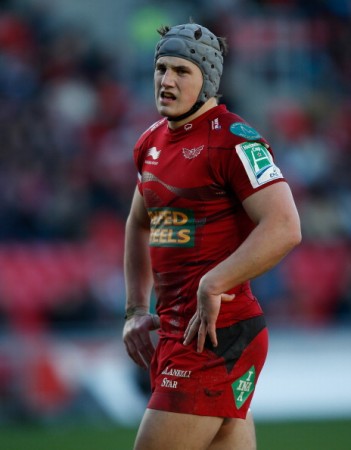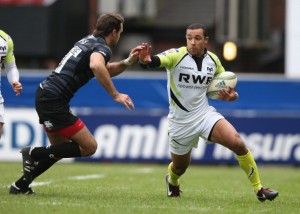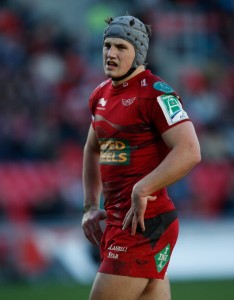
Leading by example: Jonathan Mills has epitomised London Welsh's never-say-die attitude in the Premiership
By Paul Williams
Hats off to London Welsh
MANY OF Wales’ regional rugby fans would admit to being one eyed. Thankfully, there’s now an excuse; they’re keeping the other eye on London Welsh. Whilst Welsh regional rugby is bemoaning the lack of budgets in one of Europe’s least competitive leagues, London Welsh are making a fist of it in one of the most unforgiving domestic leagues in the world. Lyn Jones and his squad currently find themselves in tenth place, three places clear of the drop – they’re eight points above London Irish and nine clear of Sale. I’m not suggesting for a minute that London Welsh are going to stay in the Aviva Premiership. However, you rarely hear them bemoaning their lot; publicly at least. London Welsh find themselves in a far less glamorous environment than the Welsh regions. The Blues currently have Cuthbert, Roberts, Halfpenny and Warburton. The Ospreys have Ryan Jones, Dan Biggar, Adam Jones and Tipuric. The Scarlets have George North, Jon Davies, Scott Williams and Liam Williams. London Welsh have no-one, unless you count Gavin Henson and Sonny Parker. There are few marquee names at London Welsh and there is little reason to believe that any will arrive; plus they have to cope with the very real threat of relegation and they’re essentially playing all of their home games ‘away’ at their adopted home in Oxford. London Welsh are a fine example of coaching over poaching. The Welsh regions should look and learn.
Eli Walker
If it wasn’t for Eli Walker Welsh regional rugby would have been a very drab affair in December. Low skill levels coupled with high rainfall and a penchant for 16 stone wingers reduced the majority of the pre-Christmas programme to an exhibition of the two yard ‘pick and go’, wings carrying the ball predictably through the central channels and deep set outside-halves hoofing it to the corners. That is unless you were Eli Walker. Walker’s lateral movement unpicked every defence from South Wales to the South of France. Walker is able to traverse six to eight yards, laterally, in two or three steps without losing pace or balance. It’s a real talent. I’m not suggesting that Eli Walker is ready for test rugby, but where others require a ‘dogleg’ defence to make a line break, Walker merely requires a ‘gerbil’s ankle’ and he’s gone. It’s so refreshing.
Shaun Edwards joins Wales full time.
This week Shaun Edwards quit his role with London Irish and joined Wales fulltime. It’s an intriguing move. Edwards has never been a permanent member of the Welsh coaching staff. Ever since he joined the set-up he has always preferred to err on the side of caution and keep his finger in the occasional English pie. Yet at the same time that he was omitted from the Lions coaching staff, by Gatland, he decides to join the WRU on a full time basis. Weirdly it’s as reassuring as it is unsettling. Currently the movement of the Welsh coaching setup off the field is more interesting than the performances they are directing on it – which is never a good thing.
Jon Davies – the best 13 in the world
Welsh rugby has had very little to cheer about in the last four weeks. That is unless you’re Jon Davies – the Scarlets and Wales’ No 13. Davies has recently been named in a Southern Hemisphere World XV of the Year. Had this been an Australian rugby writer’s vote, where Davies had beaten Ben Tapuai or Adam Ashley Cooper, it wouldn’t have raised an eyebrow. If Davies had pipped Juan de Jongh or Jean de Villiers to the post in a South African rugby writer’s world XV; few comments would have been passed. However Jon Davies was voted as the world’s best outside-centre in the famously acerbic New Zealand media – ahead of Conrad Smith. Yes, Conrad Smith, the most complete 13 in world rugby. His defence, passing and subtle lateral movement are second to none – except to Jon Davies it would seem. New Zealand have produced some of the finest outside centres in the history of the game; so to vote for one of ours over one of their own is a fern, sorry, a feather in the cap.
Ospreys earn respect
Over recent years the Ospreys, rightly or wrongly, have become the team that most Welsh neutrals have come to resent. The Ospreys became synonymous with ‘soccer’ style budgets and media profiles to match. But no longer. The Ospreys now find themselves in the same quagmire as everyone else. There are no grizzled ex-All Blacks on the horizon; they have the same budget constraints and recruitment limitations as the rest of the regions. There is however one major difference. The show ponies may have left, but the workhorses remain. Adam Jones’ return to the squad after injury has been profound. Ryan Jones’ and Richard Hibbard’s five yard carries mean that the Ospreys rarely fall short of the gainline. Kahn Fotuali’i has emerged from his slumber and morphed into one of the world’s best scrum halves and Dan Biggar is having the best season of his unfeasibly youthful career – he’s still only 23. And in December the Ospreys beat Toulouse as well as a clean sweep of the regions. Like it or not, at the moment the Ospreys are the only reason for any optimism in regional rugby. And to think there were unsubstantiated suggestions they should be disbanded. Lunacy.








